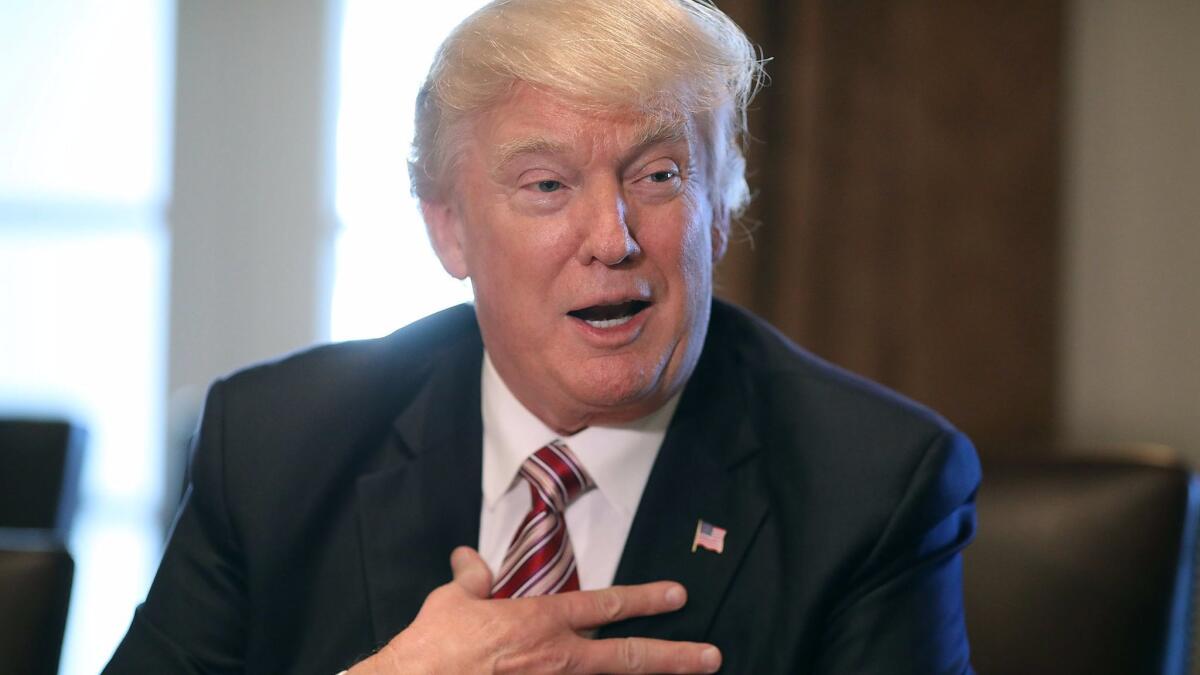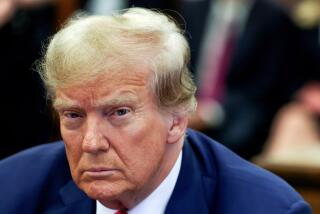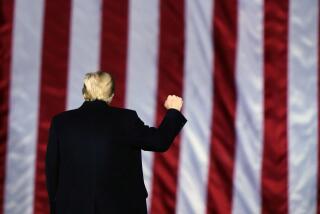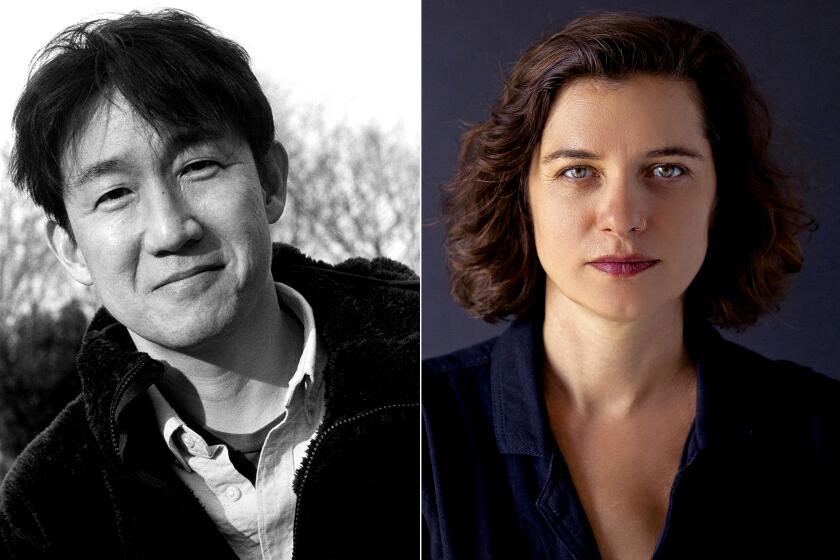Embattled and emboldened: Arts and culture in the age of Trump

In these desperate political days when facts are being flicked away like flies, a minor incident in Anton Chekhov’s “The Three Sisters” keeps replaying itself in my mind.
Ivan Chebutykin, an army doctor and an old friend of the Prozorov family, carelessly drops an expensive clock that Irina, the youngest of the Prozorov sisters, tells him belonged to her dead mother, whom he once loved.
Chebutykin, who adores the sisters but drinks too much, curiously replies: “Very possibly. No doubt it was your mother’s if you say so, but what if I didn’t really break it, what if we only think I did? What if we only think we exist and aren’t really here at all? I know nothing and nobody else knows anything either.”
Full Coverage: What L.A. would look like without the NEA »
Chekhov provides just enough context to explain Chebutykin’s burst of nihilism. The doctor blames himself for having recently lost a patient and is full of regret for a life that has passed him by. At the end of the play, as the sisters steel themselves after their hopes have been dashed, he mutters, “None of it matters. Nothing matters.”
It’s doubtful that President Trump, were he to catch a revival of “The Three Sisters” one weekend in Palm Beach, would notice any resemblance between himself and Chekhov’s jaded doctor. Chebutykin is too weak and minor a figure to appeal to a man who has his name slapped on gilt buildings across the world. But they both play fast and loose with reality to elude accountability and excuse their weaknesses with an overgeneralized cynicism.
As a character, Trump falls outside the Russian playwright’s repertoire, but it’s fascinating to consider how Chekhov might have balanced sympathy for Trump the man with satire for Trump the political cartoon. No wonder the president, a businessman who has deployed his marketing genius to turn himself into a successful political brand, wants to pull the plug on governmental funding for writers and artists. Who needs the bad publicity?
Trump’s recent budget proposal has put the arts and humanities in his crosshairs. His administration sees no public interest in supporting the way Americans make sense of the world through creative and intellectual expression. The “law and order” president wants to increase defense spending while dismantling the National Endowment for the Arts and the National Endowment for the Humanities, agencies that represent only a meager fraction of the federal budget.
None of this comes as a surprise, yet the clear articulation of Trumpian values is still a shock to the system. The arts aren’t a useless appendage that can be lopped off without inflicting serious damage. They are an essential part of our navigational equipment as a species.
Since the election, I have been urgently seeking direction from dramatists in the way a cardiac patient might turn to nutrition and meditation after a heart attack. I have been thinking not just of Chekhov but of Harold Pinter, who is an even better guide to Trump’s brutal relativism and canny opportunism. Pinter’s plays throw into relief the territorial nature of human beings — the way reality, both present and past, is a turf war in which the will to dominate supersedes all other considerations.
In Pinter’s “The Homecoming,” Lenny, meeting his sister-in-law for the first time, brags about assaulting a woman “who was falling apart with the pox.” “How did you know she was diseased?” a cool Ruth, refusing to be intimidated by this display of male dominance, inquires. “How did I know?” Lenny replies. “I decided she was.”
A political science course could be devised around Lenny’s “I decided she was.” The will to power is a talking game. Pinter understood as well as any modern playwright the weaponry of words in the battle of human relations. “The speech we hear is an indication of that which we don’t hear,” he shrewdly observed. “It is a necessary avoidance, a violent, sly, anguished or mocking smoke screen which keeps the other in its place.” (For a clumsy illustration of this quintessential Pinter insight, check out one of White House Press Secretary Sean Spicer’s daily briefings.)
Trump’s no-holds-barred campaign should have prepared us for the absurdist drama he’s staging at the White House, but linear-minded people are easily overwhelmed by tactical incoherence. Disorder, fully intentional or not, is exhausting. When the networks on election night called Pennsylvania for Trump, I turned off the television and went to bed. Shaken by the prospect of a Trump presidency, I consoled myself with the thought that at least I had “King Lear” to retreat into. I’ve been working on a long essay about the nature of wisdom in a tragedy that privileges experience over other forms of knowledge, and I badly needed Shakespeare’s long view to pull me through.
Literature, theater, music and the visual arts promote contemplation. They invite individuals to ask questions, consider alternative views.
I was raised Catholic, but my adopted church is the one in which the scripture is by Aeschylus, Sophocles and Euripides, Shakespeare and Molière, Ibsen, Chekhov and Beckett and a dozen other playwrights who widen the frame of our understanding by presenting us with characters who are in collision with one another, with society and with the very nature of existence itself. Empathy and complexity are the goals of this secular liturgy, which challenges us to see through stereotypes, to reject received wisdom, to question authority and to interrogate the assumptions and blind spots of justice.
Moving beyond the Dante-esque midpoint of my life’s journey, I’ve been wondering how I might share what I’ve personally gained from the theater. My gratitude extends beyond the occupational perk of orchestra seats for top-drawer entertainment. The deeper indebtedness I feel has to do with the way the stage has changed me internally by exposing me to experiences I might not have otherwise encountered. The theater may not have fixed my many faults, but I’m a more curious and open-minded person because of what it has shown me. I wish everyone could have the benefit of this continuing education.
The ancient Greeks believed in the concept of paideia. The term encompasses the culture that molded the character of Greek citizens, developed the power of their philosophical thought and cultivated within them a more humane morality. Education was understood to be a communal process that extended far beyond the classroom. The arts were seen as particularly instrumental in clarifying the ideals of Greek society.
Where has our sense of paideia gone in 21st century America? The fault, dear reader, lies not simply in our reality TV star turned president, who is as much a symptom as a cause, but in ourselves for allowing our shared values to be overrun by the marketplace. When did business, with its narrow scope of profit and loss, win the battle of ideas in our country? Surely it predates our first MBA president, George W. Bush, who ironically broke the economy. Capitalism’s victory over communism in the Cold War was a clear victory for freedom, but the triumphalism of the global oligarchy has profoundly impoverished our intellectual life.
No one keeping tabs on political discourse these days can have much confidence in the state of critical thinking. Is there any relationship between the decline in humanities in higher education and the dim cognitive wattage coming out of Washington? Trump admitted during the campaign that he loved “the poorly educated,” which isn’t to say that he liked his voters stupid but that he preferred them unread. Books, a testing ground for ideas, can lead people to think for themselves.
The arts and the humanities nixed by Trump’s budget proposal pose a direct challenge to demagoguery. Literature, theater, music and the visual arts promote contemplation. They invite individuals to ask questions, consider alternative views and second-guess what they’ve been brainwashed into believing.
There’s more at stake in the fight to preserve the NEA and the NEH than the next ‘Hamilton.’
SIGN UP for the free Essential Arts & Culture newsletter »
My politics are obviously fairly progressive, but my family background is solidly Republican. The “opposition” for me isn’t abstract — it’s who I break bread with at Christmas. Conservative readers sometimes take me to task when my political views leak out. But I have trouble assuming that certain values aren’t universal.
I can accept, for example, that environmental policy decisions are complicated and must be weighed against economic costs. But I cannot countenance a rejection of climate science under the pretense that, because everything isn’t understood, nothing is known. I feel similarly about the issue of inequality. I don’t presume to know the best policies to counter the economic trends that have been eviscerating the middle class, but history gives us some indication of how we got here. Providing generous tax breaks to the rich while slashing educational funding seem to me the equivalent of fighting a fire with kerosene. Party enmity can’t be allowed to paralyze common sense.
Some might say that none of this falls within my bailiwick as a drama critic — that my job is to give readers my verdict on theater productions and that I should stick to Shakespeare and show tunes and shut up about the state of the world. But the arts hold a mirror up to nature, which includes politics, and playwrights dating back to 5th century BC Athens have understood the uniquely public aspect of their art form. The stage is one of the few places left in our democracy where citizens turn off their phones to collectively confront the thorniest issues of the day.
Just as the playwrights I admire most can’t separate the poet from the political thinker, I can’t compartmentalize myself as a critic. While I hardly think my views on ballot measures are of interest to my readers (they barely interest me), I would contend that my experience as a citizen is as relevant to my understanding of plays and musicals as my knowledge of psychology gleaned from a lifetime of personal relationships. Nothing delights me more than superlative showmanship, but it’s the human story, in all its public and private complexity, that moves me most as a professional theatergoer.
It is imperative that those of us fortunate enough to earn a living in the embattled arts and culture sector of the ruthless U.S. economy do more than advocate for our professional survival. Yes, the arts create jobs. But even more important, they support the human infrastructure of our society. There’s more at stake in the fight to preserve the NEA and the NEH than the next “Hamilton.” Our souls, which is to say our fundamental values, are on the line.
Election night might have had me wanting to retreat into “King Lear” but only so that I might eventually share what I found there. Keats writes, “Man should not dispute or assert but whisper results to his neighbour.” Poetry, in all its forms, is a way of confiding to one another our most profound truths. The arts help us to refine our reality. They encourage us to look harder at the objective facts others choose to blithely deny. And they point our attention to what remains hidden from sight yet sustains us and endures long after we’re gone.
Follow me @charlesmcnulty
ALSO:
From the art critic: Why the NEA works
From the music critic: History tells us the fight ain’t over
L.A. Without the NEA: What’s gained — and what would be lost
More to Read
The biggest entertainment stories
Get our big stories about Hollywood, film, television, music, arts, culture and more right in your inbox as soon as they publish.
You may occasionally receive promotional content from the Los Angeles Times.







